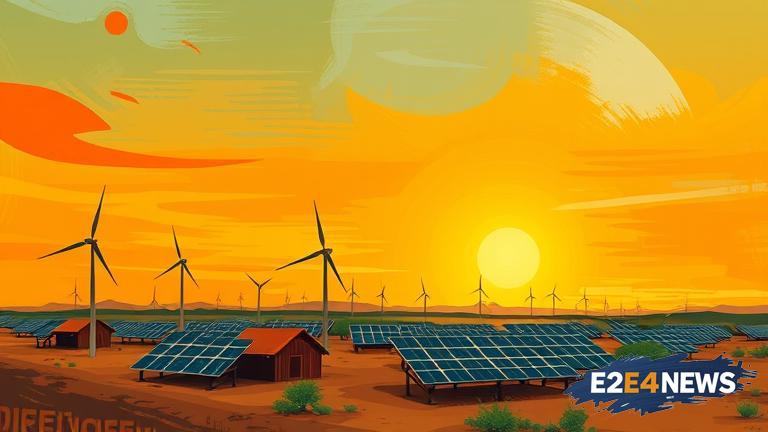Africa has been at the forefront of the global renewable energy revolution, with many countries on the continent investing heavily in solar, wind, and hydroelectric power. The African Union has set ambitious targets to increase the share of renewable energy in the continent’s energy mix, with a goal of achieving 100% renewable energy by 2060. South Africa, for example, has made significant strides in renewable energy, with the country’s Renewable Energy Independent Power Producer Procurement (REIPPP) program attracting billions of dollars in investment. The program has enabled the development of numerous solar and wind farms, which have not only reduced the country’s reliance on fossil fuels but also created thousands of jobs. Similarly, Morocco has emerged as a leader in renewable energy, with the country’s Noor-Ouarzazate solar power complex being one of the largest in the world. The complex, which spans over 3,000 acres, has the capacity to generate 510 megawatts of electricity, enough to power over 1 million homes. Other African countries, such as Egypt, Kenya, and Ghana, are also making significant investments in renewable energy. Egypt, for instance, has launched several initiatives to promote the use of solar energy, including a program to install solar panels on rooftops across the country. Kenya, on the other hand, has invested heavily in geothermal energy, with the country’s Olkaria geothermal complex being one of the largest in the world. Ghana has also made significant progress in renewable energy, with the country’s solar energy sector experiencing rapid growth in recent years. The growth of renewable energy in Africa has been driven by a combination of factors, including declining technology costs, government policies, and increasing demand for energy. The cost of renewable energy technologies, such as solar panels and wind turbines, has fallen dramatically in recent years, making them more competitive with fossil fuels. Governments across the continent have also implemented policies to support the development of renewable energy, such as tax incentives and feed-in tariffs. Additionally, the demand for energy in Africa is increasing rapidly, driven by population growth and urbanization. Renewable energy is seen as a key solution to meeting this demand, while also reducing greenhouse gas emissions and mitigating climate change. The African Development Bank has also played a crucial role in supporting the growth of renewable energy in Africa, providing financing for numerous renewable energy projects across the continent. The bank’s Sustainable Energy Fund for Africa, for example, has provided funding for several renewable energy projects, including solar and wind farms. The growth of renewable energy in Africa has also created new opportunities for entrepreneurship and job creation. Many African countries are now home to thriving renewable energy industries, with numerous companies providing services such as solar panel installation and maintenance. The renewable energy sector has also created thousands of jobs, both directly and indirectly, with many people employed in the manufacture, installation, and maintenance of renewable energy technologies. Furthermore, the growth of renewable energy in Africa has also improved energy access, particularly in rural areas. Many communities that were previously without access to electricity are now able to access energy through renewable energy sources such as solar and wind power. This has had a significant impact on the quality of life, with people able to access basic services such as healthcare and education. The growth of renewable energy in Africa is expected to continue in the coming years, driven by declining technology costs and increasing demand for energy. As the continent continues to transition towards a low-carbon economy, renewable energy is likely to play an increasingly important role. In conclusion, Africa’s renewable energy revolution is gaining momentum, with many countries on the continent investing heavily in solar, wind, and hydroelectric power. The growth of renewable energy in Africa has been driven by a combination of factors, including declining technology costs, government policies, and increasing demand for energy. As the continent continues to transition towards a low-carbon economy, renewable energy is likely to play an increasingly important role.
